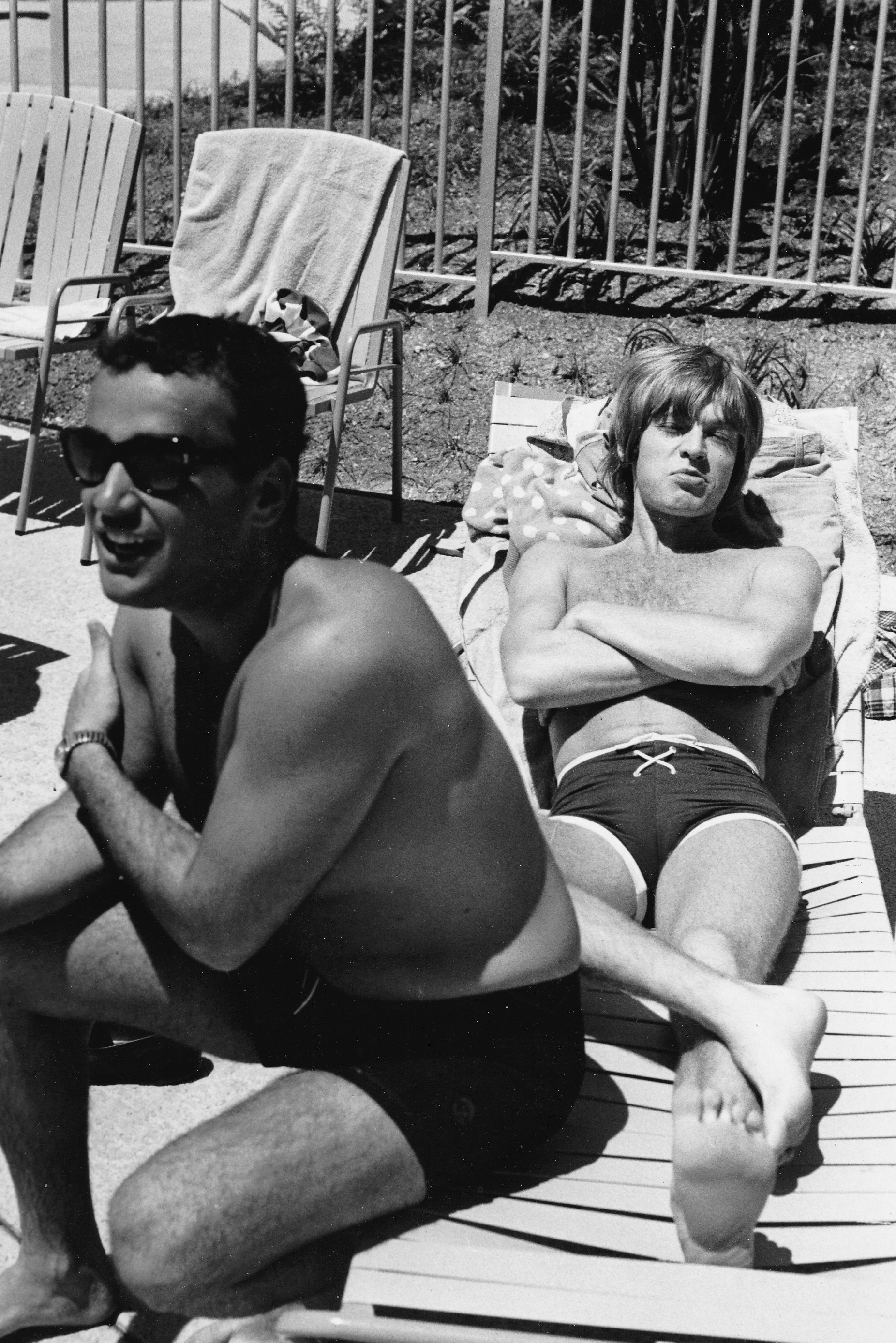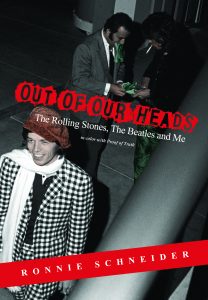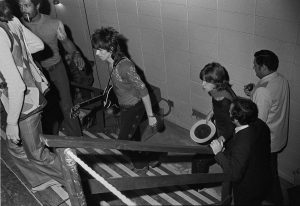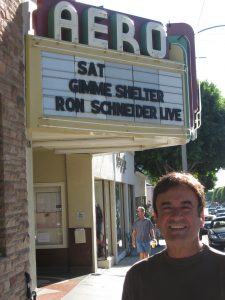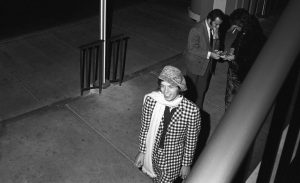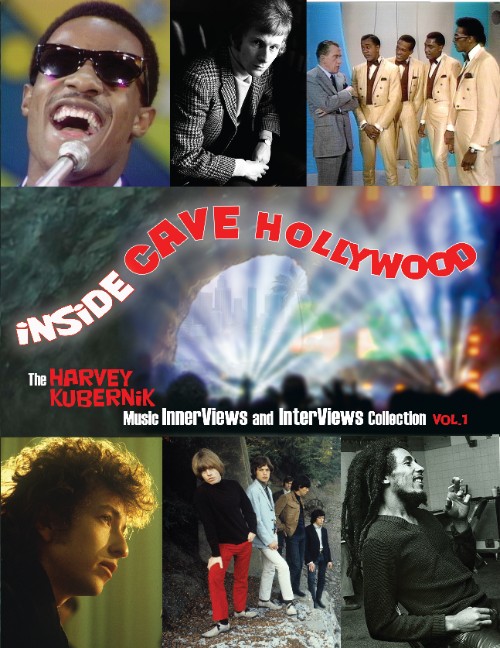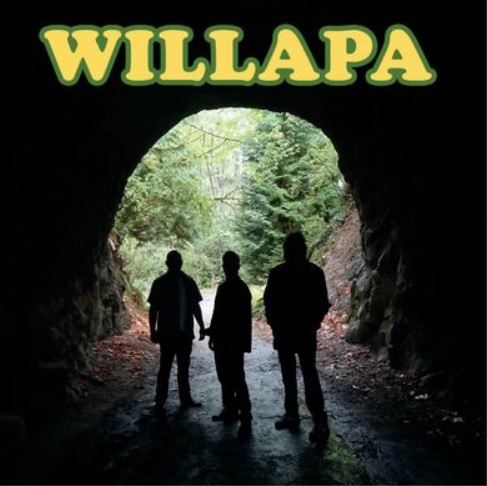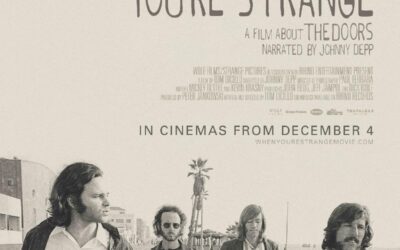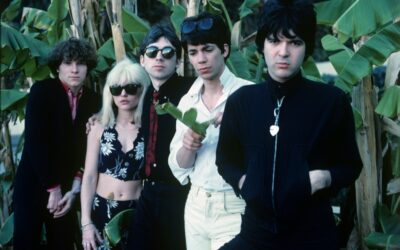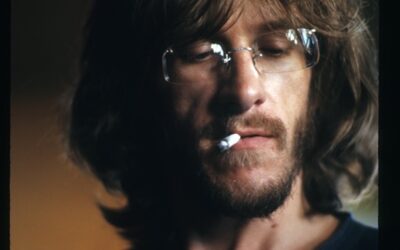© 2017 Harvey Kubernik
“Ronnie Schneider we’d known. He’s Klein’s nephew but he broke away from him.  He’s a smart cat. I dig Ronnie. He’d been on a lot of tours with us handling business and hung around with us. He was the only cat we knew in ’69 who could handle the Stones tour that everybody knew, that we could leave to get on with it till we got there.”
He’s a smart cat. I dig Ronnie. He’d been on a lot of tours with us handling business and hung around with us. He was the only cat we knew in ’69 who could handle the Stones tour that everybody knew, that we could leave to get on with it till we got there.”
—Keith Richards to Robert Greenfield Rolling Stone magazine August 19, 1971
On November 8, 1969 I saw two Rolling Stones’ concerts at the Inglewood Forum in Southern California. Also on the bill were Terry Reid, B.B. King, and Ike & Tina Turner. There had been interminable delays in covering the Forum’s hockey rink, home of the Los Angeles Kings, in preparing the stage. The Stones’ first show started around 11:45 p.m. The second one ended at 5:15 a.m.
As a teenager, I had no idea about how the bands got paid that night, who they hired to handle box office receipts or what people were employed to secure payment from these still-inspiring and life-altering events I witnessed.
By 1970 I would find out there was only one character. A business manager from ABKCO named Ronnie Schneider. With no support staff, Schneider went on the road with the Stones managing tour finances on their previous 1965, ’66 and especially their ’69 U.S. trek. Schneider forged a solid and lucrative working relationship with the Stones doing settlement with promoters at the venues before the group’s set ended.
During 1962-1964, Schneider, fresh from University of Miami, interned at ABKCO, owned by his uncle Allen Klein, dealing with Sam Cooke and Bobby Vinton under the direction of ABKCO. He eventually received a producer credit on the Herman’s Hermits film, Mrs. Brown You’ve Got a Lovely Daughter, and produced a Tony Anthony spaghetti western, The Silent Stranger, that was shot in Japan.
It was during 1965 when Ronnie started working with the Rolling Stones. In 1969, the Stones severed their active relationship with ABKCO and Allen Klein. Upon the urging of Mick Jagger, Schneider was asked to independently helm business concerns on their 1969 U.S. tour.
In 2017 Ronnie Schneider became an author with an informative and revealing book, Out Of Our Heads The Rolling Stones, The Beatles and Me with Proof of Truth, published by CLB, Inc.
Until his account was published, Schneider’s pivotal role in the saga of the Stones’1965-1970 hasn’t really been fully noted or properly acknowledged. Schneider was also privy to the difficult relationship between the Rolling Stones and influential TV host Ed Sullivan at 1967 and ’69 television tapings.
Schneider initiated and executed some very key decisions on behalf of his charges: hiring the Maysles Brothers to film the band in New York at Madison Square Garden, initially for promotional footage that evolved into the Gimme Shelter movie, where he received an Executive Producer credit.
His book outlines and provides chronological evidence on the never reported behind the scenes story about the infamous 1969 Altamont free concert.
Besides his self-penned affectionate text, Schneider displays a 1965-1970 paper trail of business negotiations and machinations supported with a hundred documents, memos, photos, hand-written ledgers, contracts, artifacts, promoter and booking agent telegrams, along with band correspondence that underscores his constantly ongoing and essential position in the Stones’ hierarchy. Their collective work yielded ancillary products like t-shirts, programs and assorted merchandise.
Schneider’s fact-filled volume further illustrates how he and the Stones in 1969 helped establish larger creative (production and package) and economic controls of an existing business model which demanded traditional flat fee performer fees to their new economic world where the band received 60-70 percent of the box office gross. This joint model has served as the blueprint for arena and stadium acts that followed.
Apparently, Mick Jagger was pleased with Ronnie Schneider. He then invited him to work the Stones’ tour of Europe in 1970.
While representing Allen Klein, Schneider’s insider perch also details his 1969 work at ABKCO with the Beatles in the reorganization of Apple Corps around finances, costs and the breakup of the band.
Schneider recounts the business lives of the Beatles and offers a very spiritual moment with George Harrison stopping by his desk and handing him a signed paperback of Autobiography of a Yogi.
In the seventies and eighties Schneider worked in college concert promotions and cable jazz programming and this decade decided to tell his intriguing and accurate tale.
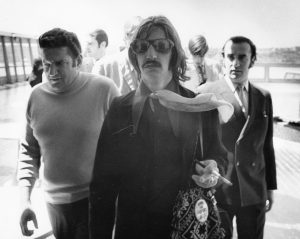 In July 2017 I conducted a four hour interview with this energetic yenta in West Los Angeles.
In July 2017 I conducted a four hour interview with this energetic yenta in West Los Angeles.
Some highlights below.
Harvey Kubernik and Ronnie Schneider interview
Q: Why did you decide to finally do a book?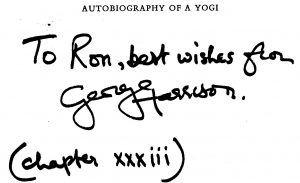
A: Well, two things. I never thought or expected to write a book unless I was in prison. (laughs). Or locked up for something. (laughs). Over the course of the years I’ve always told the stories, and the responses have always been, “you should write a book.”
And, over the years, and many decades, I have heard so many lies, and made up stories by people who weren’t there. Books on the Stones and a recent book about Altamont. And I thought, ‘I’m the one actually with the true story.’ I was always the only other guy besides the band, in the room. So I finally decided to do it.
I went to work for ABKCO in 1963. And from the mid-sixties I’ve always kept notes, items, ledgers, telefaxes, telegrams and photos.
I met in 2012 with you and your brother Kenneth about a potential book and you encouraged me to do it myself. I realized at my age, 69, no one is hiring me anymore.
I could have just told stories. But, what I did, I went to my files, and found I had all these records, memos, contracts and documents. When I started to scan them I realized things were laid out in a chronological order.
I can tell you things I did but not the places where they happened. So the memos and documents provided specific context. I looked at the visuals, as well as photographs from people I had worked with over 50 years, and knew I had a book. The timeline fit the documents.
Q: What about the writing process?
A: I decided to be Ernest Hemingway. Get up in the morning. Start and write for three hours, sort of know what you’re gonna write next and stop. I began by always saying how I got to a juncture in my story. I didn’t spend a lot of time writing about my life pre-1965 because no one would really care about that. (laughs).
I put all the bio stuff to the side because I knew everyone only cared about the Rolling Stones and the Beatles, and this golden 1965-1970 era. George Harrison told me, “Ronnie, you were the smart one! You got out in time!”
I did it for the fans. And to write a book to show there was real love between the Stones and their fans then. In 1965, ’66, they weren’t doing it for the money. I can tell you the joyous peaceful times before it became charging percentages and monies earned.
I did work with editors Mike Stax and Gerald Vanderleun. I also had long-time relationships with noted photographers Ethan Russell and Gered Mankowitz, and Thomas Monaster, who gave me a lot of photos to supplement my own archives. Ethan really helped and gave advice. And Gered was also helpful
Q: Surely you must have had some interest from established book publishers and independent publishers for your book.
A: Sure. I already knew about the book business from some previous ventures I was involved with. I’ve done book deals. I then decided after researching on the internet that I needed to do this myself. I do my own work. I had a computer program which allowed me to create the book and now make it available. The publishers would all have an opinion of what my book would read and sound like. And, after initial publication, most of them do not do marketing.
Q: Do you feel you were at the epicenter of a monumental pop culture moment 1965-1970? You’re now looking back a half a century at events that informed not only music and consumers but impacted lives.
A: At any given moment I can discuss this stuff and it triggers everyone else’s memories. There is a bond because we went through this together and it filters down now to a couple of generations. The fan mail from Europe and places like Denmark have been terrific.
Q: I think part of the success in creating this book and the story you tell, is that you were beyond being an embedded journalist. You handled the money at the box office before and after the shows. You had no staff or assistants or all sorts of characters with egos trying to parade the trust you established with the group going back to 1965.
A: The first time I met the Rolling Stones was in 1965 in New York. A big PR event on a boat. I then flew out to Los Angeles in 1965 and the first time I really met the band was for them to sign some papers. I had to get them to go to the doctor to get physicals and to take them to an insurance company.
Before then, in the summer of 1963, I worked with Bobby Vinton and Sam Cooke as an accountant. I wasn’t into hard core rock. I loved Sam Cooke and [former manager and confident] J.W. Alexander. Sam’s voice I can only describe as melted butter. So smooth and nice. And Sam would say to me, “my act is basically my voice and biting my lower lip.”
Well, my uncle Allen was a character. That’s what it comes down to. He had a hard driving type A personality. It was just intense. At times he would say to me, ‘You’re smarter than me but you don’t have the personality.’ He always had that way to get things done. The bravado was the personality. And then he got leverage because he had the groups and he used that leverage.
What happened was that he first took the step forward to challenge the record companies. Before that, everybody went along with it. He made the record companies submit to audits and found the money they were not accounting for, got it, and gave it to the talent. Like he did for Sam Cooke. He found Sam money. Allen also gave Sam a Rolls Royce Silver Cloud that J.W. Alexander used to drive around all the time. He often got personally involved in his artists’ lives.
When I first started, I really had no idea what I was supposed to do. I remember the crowds and Allen said, ‘Just represent me in the box office.’ And, Jerry Brandt, the booking agent at the William Morris Agency, also told me “don’t trust the promoters. Get into the box office early and count the tickets. Review the technical things.” I was an accountant with Allen working in the back.
Allen then started bringing me up through the ranks at this point. And he needed somebody right away to go on the road with them. He wanted somebody in the box office.
Usually what happened was the box office would close before the show ended. Then I could go in and get my settlement. There might be a 20 or 30 minute fight. Once that was done I could go out. I never really got to see any of the opening acts. In 1965 I saw some of Patti Labelle and the Bluebells.
In 1965 and ’66 after every show Allen would call me at the hotel. Originally it was at 2:00 a.m. in the morning but he stopped that. Sometimes I would have to either carry the cash to different places, remember there weren’t lots of banks in the area then.
Remember: I’m the guy getting the money at the shows. I’m the American the band could talk too. There were road managers. Mike Gruber was the main one, and Bob Bonis. At the time in 1965, the Stones were getting a few thousand dollars.
By then I was starting to get into contracts and my uncle instructed me about “there are no comps.” That was the first thing I learned to tell these old school promoters. Scams were pulled and they freaked when I told them, “You owe me money.” After a battle I would show them the contract and they would be screaming.” I learned that. My instincts were always on behalf of the band. When I had the money I made sure everyone was around.
I was also the one person they could all talk too. It was a fairly innocent time, although they were smoking a little pot. That was it. The Stones were sweet guys. Acid was starting to come around in 1965, ’66. I already knew I wouldn’t want to be involved.
There were lots of girls. We would have hotels secured where the fans did not know where they were booked and where the girls would not be waiting at the hotels. It was nice but a little scary.
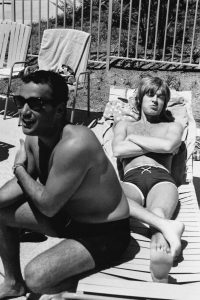 Q: Tell me about the 1965 and ’66 Stones.
Q: Tell me about the 1965 and ’66 Stones.
A: I liked them all. Bill liked women and always wanted to get laid. There was always Mick and Keith. It was a group dynamic. Brian would want something. He was a sweet little guy and a very sensitive artist but he was dangerous. Charlie liked to watch and analyze what was happening and what I was doing. A typical English stiff up lip guy and I liked him a lot. He was always talking to his wife Shirley. A devoted husband. Mick always wanted to know everything. I knew very early on that Mick was running the band. Brian early on, that was the battle, but Mick and Keith were the leaders. They would always be in hotel rooms working together and writing songs. They would work closely together. And, Keith didn’t care about money.
Keith liked to go horse-back riding. Keith saw how I operated. He trusted me and liked hanging out. He’s a good guy and doesn’t take any bull shit. When he was with Linda Keith they would come over to New Jersey where I lived and go swimming. Keith was cool to begin with. He’d always want a portable record player with a turntable in two Samsonite cases in his room. I’d give him petty cash and he would buy stacks of 45 RPM records. I went to Wallichs Music City in Hollywood with the band. Keith would sit in his room listening to music all the time.
There was an incident in Sacramento where Keith almost got electrocuted. It was a shock from a microphone stand. I heard screams and the noise and everyone went quiet. ‘What!’ I do remember coming out and seeing them actually reviving him up there.
I loved Ian Stewart. I like people that are hard workers that aren’t bull shit and don’t cause drama.
Q: You socialized with the act. Record producer/songwriter Bob Crewe and photographer Jerry Schatzberg told me about hosting parties for them in New York City.
A: I was also in clubs with Keith and got hit with nightsticks when he and the Stones were hassled by guys. We were basically the same age and in the trenches together. I had their backs and the band members appreciated it. And, unlike most people, I never wanted anything from them. I wasn’t trying to use them and they knew that.
We would go to clubs together. I went to the Apollo Theater in Harlem with Mick and Keith to see James Brown. We were the only white people in the room. People were passing a bottle to us during his incredible performance.
I knew even in 1965 the Stones were very special. And I noticed each member in the band had fans clubs that really loved them. There were all sorts of Brian, Bill, Keith and Charlie Watts’ fans. They were coming to see the Rolling Stones not just Mick Jagger.
Also know when it came to energy, we worked 24 hours a day basically. We had a shared work ethic and it got very intense.
And Jagger would be up there. He was all over the stage. In 1965 the shows were only 30 minutes long. It still is amazing.
As far as my book, I know the stories are true, and even though I’m handling money, negotiations, petty cash, receipts and most of the time I was in the box office at their live shows.
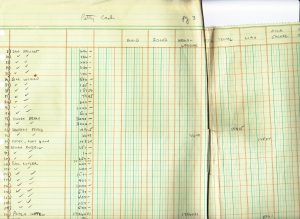 I know the reader feels my relationship with the Stones over a period of years. It’s a different view of the Stones than we’ve gotten before. I was at some recording sessions, attended the Rock and Roll Circus, and scouted a location in Rome for a Stones’ show, on the road, in airplanes, dealing with administration, even more on the band’s 1969 tour of America. I had trust with the group.
I know the reader feels my relationship with the Stones over a period of years. It’s a different view of the Stones than we’ve gotten before. I was at some recording sessions, attended the Rock and Roll Circus, and scouted a location in Rome for a Stones’ show, on the road, in airplanes, dealing with administration, even more on the band’s 1969 tour of America. I had trust with the group.
The Stones dictated everything. They wanted the art seen. It was the perfect storm. They got a guaranteed 65 percent of what I got out of the gate as opposed to a flat fee. It was a percentage deal.
They were at the peak of their powers. And, I could watch every part of the show and it was great. During the 1969 tour I could catch Ike & Tina Turner with the Ikettes. I loved them. I had tons of interactions. Tina Turner was always funny. Tina was a flirt. (laughs). She would roll her eyes and wore a see-through top.
I liked Ike a lot. He was incredible. There was a big potential money shakedown scene that might have gone down at the Oakland Coliseum 1969 show. And Ike said if there was a problem with me handling and delivering the money he’d take care of it. And showed me he was packing a big fuckin’ Colt 45 gun.
I loved B.B. King. I chatted with him on the 1969 tour and he was so appreciate of the slot he had on the Stones’ tour.
Even when I left ABKCO in 1969, Mick Jagger, who I now saw taking over the finances and the money, called and asked me to do their 1970 European tour. I didn’t say yes immediately until it was discussed with my uncle Allen.
I did the tour. And the rule that I set for the European tour were no people backstage.
(Harvey Kubernik is the author of 12 books, including Leonard Cohen, Everybody Knows, and Neil Young, Heart of Gold. In April 2017, Sterling published Kubernik’s 1967 A Complete Rock Music History of the Summer of Love. Harvey Kubernik is currently writing and assembling his debut literary music anthology and a multi-voice narrative book on the Doors. Both are scheduled for publication last quarter 2017).

